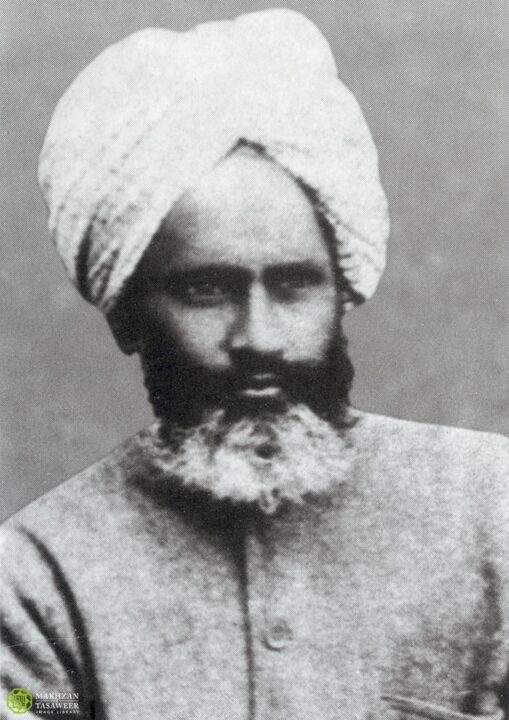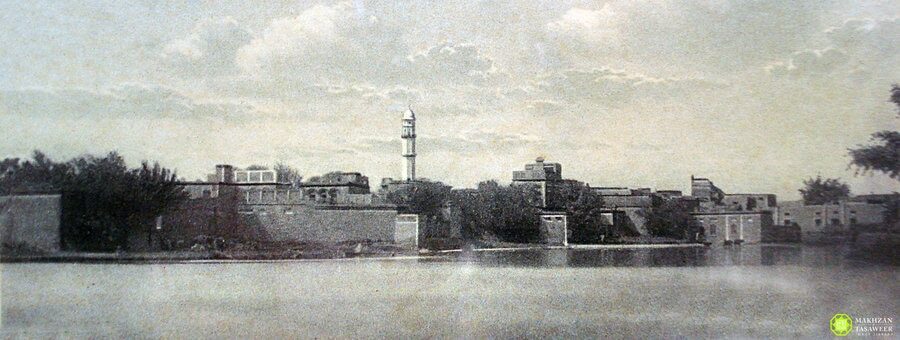In this third year of Al Hakam, we will present a selection of incidents from the blessed life of the Promised Messiahas with some more details
15 January 1889: The Promised Messiahas wrote to Hazrat Mian Abdullah Sanaurira, saying that he was blessed with a child and named him Mirza Bashiruddin Mahmud. Huzooras added that his aqiqah [Islamic tradition of sacrifice on the occasion of a child’s birth] would be held on the coming Friday. (Maktubat-e-Ahmad, Vol. 3, p. 204)
15 January 1901: The Promised Messiahas issued an announcement, in which he declared his intention to start a monthly magazine in the English language to convey the spiritual truths to the English-speaking people of the world. Its primary object was to be the publishing of his own articles in support of Islam. It was to be edited by Maulvi Muhammad Ali Sahib and Khawaja Kamaluddin Sahib. This magazine is known today as The Review of Religions. (Majmua-e-Ishtiharat, Vol. 3, p. 147)
15 January 1903: The Promised Messiah’sas Arabic book (with Persian translation), Mawahib-ur-Rahman (Bounties of the Gracious God), was published on this date from Zia-ul-Islam Press, Qadian.
Mustafa Kamil Pasha, Editor of an Egyptian journal, Al-Liwa, criticised the action of the Promised Messiahas in directing his followers not to get themselves inoculated against the plague. The paper argued that such a course of action was against the teachings of the Holy Quran, which says, “And cast not yourselves into ruin with your own hands” (Surah al-Baqarah, Ch2: V. 196).
The attack was made out of sheer ignorance without taking into consideration why the Promised Messiahas had urged his followers against the vaccinations and therefore, such an attack warranted a full-fledged reply from the Promised Messiahas in the Arabic language.
15 January 1906: On this day, the Promised Messiahas received the following revelation:
تزلزل در ایوان کسری فتاد
“Shaking in the palace of Chosroes.”
At the time, when this revelation was revealed and published in all Urdu and English newspapers and periodicals of the Jamaat, the ruler of Iran sat comfortably on his throne.
Hazrat Jalaluddin Shamsra, referring to this prophecy, noted, “After this revelation, there was a totally unexpected revolt in Iran and Mirza Muhammad Ali, King of Iran, was forced to take refuge in the Russian embassy on 15 July 1909”. (Tadhkirah [English translation], p. 814)
16 January 1886: Huzooras informed Hazrat Munshi Rustam Alira that he would go [to Hoshiarpur] in two days’ time and told him to pray for him. (Maktubat-e-Ahmad, Vol. 2, p.468)

17 January 1905: The Promised Messiahas received a letter in English from someone in Europe.
In the letter, the gentleman stated that he and his wife had read the English parts of the books of the Promised Messiahas that they had available. He added that his affiliation was with a small sect of Christianity, which had abandoned the belief of the godship of Christ and believed him to be a pious person who guided men.
He further said that he would like to read about Hazrat Ahmad’sas beliefs regarding Jesusas and that he desired to read about evidence proving that his grave was in Kashmir. (Malfuzat, Vol. 4, p. 226-227)

18 January 1883: The Promised Messiahas wrote a letter to Hazrat Nawab Ali Muhammad Khanra of Jhajjar, in which he stated that he had prayed for him in the month of Safar and added that after such fervent prayers, no person could be deprived of the blessings of Allah the Almighty.
Huzooras stated that he had seen in a vision that a paper was presented to him upon which was written:
ایک ارادت مند لدھیانہ میں ہے
“There is a well-wisher in Ludhiana.”
The person’s name and home address was also mentioned; however, Huzooras said that it had escaped his memory. His [the well-wisher mentioned in the dream] faith and sincerity was further attested to on the same paper shown in the dream:
اَصْلُھَا ثَابِتٌ وَّفَرْعُھَا فِی السَّمَآءِ
“Whose root is firm and whose branches reach into Heaven.”
Hazrat Yaqub Ali Sahib Irfanira wrote a note that at some time, Huzooras thought that Mir Abbas Ali Sahib was the person who was being referred to here; however, his end proved contrary to this. This letter also tells us that Huzooras thought Nawab Ali Muhammad Khan Sahibra of Jhajjar was being referred to and incidents testified that he remained a faithful and true follower. (Maktubat-e-Ahmad, Vol. 3, p. 39-40)
18 January 1884: The Promised Messiahas wrote a letter to Mir Abbas Ali Sahib of Ludhiana, in which he stated that he had received his letter. Huzooras mentioned one of his dreams and added that a truly faithful person was one who did not hasten in breaking and cutting off ties with people. (Maktubat-e-Ahmad, Vol. 1, pp. 588-589)
18 January 1886: On this date, the Promised Messiahas replied to a letter he received from Hazrat Munshi Rustam Alira in which he stated that he planned to leave for Hoshiarpur the following day. Hazrat Ahmadas asked him to remember him in his prayers. (Maktubat-e-Ahmad, Vol. 2, p. 469)
19 January 1887: The Promised Messiahas replied to a letter from Hazrat Hakim Maulvi Nuruddinra, in which he mentioned that it was strange that medicine which he [the Promised Messiahas] had prescribed to him had no benefit. Huzooras stated that it might be, as per the saying:
ادویہ کو ابدان سے مناسبت ہے
“Certain medicines are relative to certain bodies.”
Huzooras stated that the prescribed medicine had benefitted himself and further explained how one should use it.

Hazrat Ahmadas further stated, whilst talking about selecting a printing press, that one should ensure those who work in such a place are good at their work and use high-quality ink. Huzooras added that as honesty was a rare trait among people in those days and it was not beneficial to trust verbal proclamations of people, one should always sign a written contract before giving the work of any book to a printing press. (Maktubat-e-Ahmad, Vol. 2, p.20)
19 January 1898: On this day, the Promised Messiahas replied to a letter he received from Hazrat Munshi Rustam Alira. In the letter, Huzooras acknowledged receipt of his letter and further stated that he had prayed for him and said that he would pray for him again that very night. (Maktubat-e-Ahmad, Vol. 2, p. 629)
20 January 1902: The Promised Messiahas replied to a letter he received from Hazrat Syed Nasir Shahra, in which he acknowledged the receipt of 100 rupees he sent, expressed gratitude and prayed that Allah rewarded him immensely. (Maktubat-e-Ahmad, Vol. 3, p. 329)
20 January 1902: The Promised Messiahas replied to a letter he received from Hazrat Chaudhry Ala Dad Khanra in which he explained and reminded him that it was necessary for a believer to face trials and hardships to a certain extent. One must sincerely endure these trials and not lose hope in God’s mercy. One who firmly believes that God is All-Powerful, All-Knowing, Most Generous, and Most Merciful must stand firm in his belief.
Huzooras further stated that God is He, Who, with one gesture, can solve all problems. (Maktubat-e-Ahmad, Vol. 3, p. 355)
20 January 1908: The Promised Messiahas replied to a letter he received from Hazrat Seith Ismail Adamra, acknowledging receipt of 10 rupees. Huzooras prayed that Allah protected him from daily misfortunes. (Maktubat-e-Ahmad, Vol. 3, p. 274)

21 January 1886: The Promised Messiahas went for a chillah [40-day retreat in seclusion for worship] to Hoshiarpur on a small ox-drawn two-wheeled vehicle.
One narration records that the oxen were of white colour and Huzooras also made an overnight stay in Rasulpur, situated near Taanda, district Hoshiarpur. Accompanying Huzooras was a person named Fateh Khan, who was a resident of Rasulpur. This person, after being influenced by Maulvi Muhammad Hussain Sahib of Batala, became an apostate.
During this journey, Huzooras crossed the Beas River. As there was some water on the way, upon reaching the boat, the boatman helped Huzooras make his way through the water, upon which Huzooras rewarded him one rupee. (Tarikh-e-Ahmadiyyat, Vol. 1, p. 275)
21 January 1906: On this day, the Promised Messiahas replied to a letter he received from Hazrat Syed Nasir Shahra in which he stated that he would pray for him. Huzooras further told him to remain positive and said that he should inform him of his wellbeing. (Maktubat-e-Ahmad, Vol. 3, p. 329)

